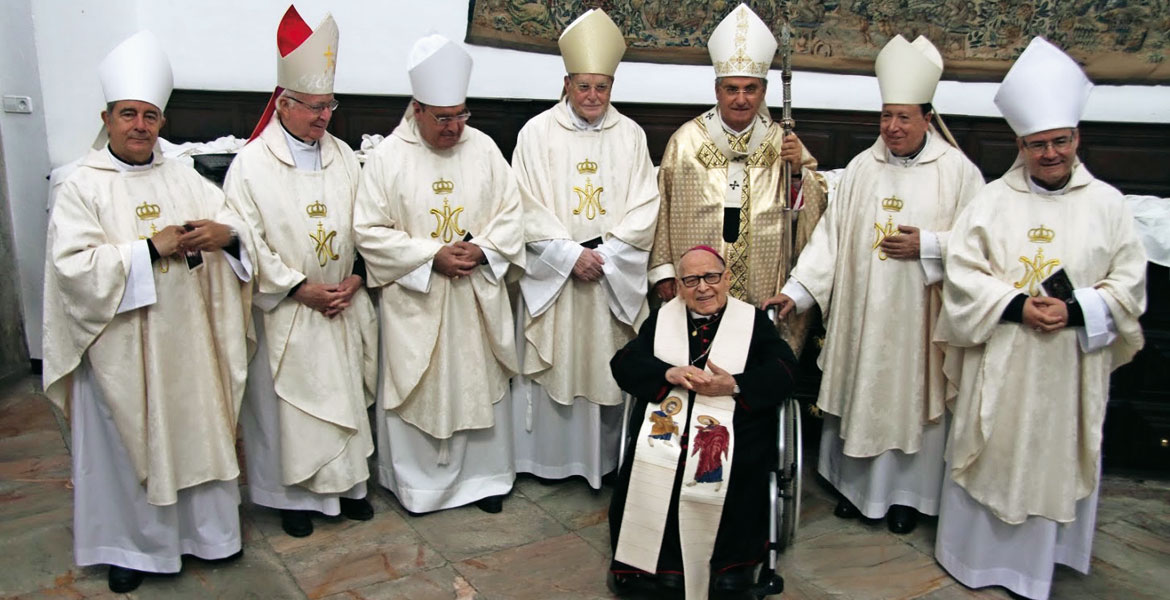The long and fruitful trajectory of service to the Church of Monsignor Anthony Monteroarchbishop emeritus of Mérida-Badajoz, but I believe that, in these pages of Vida Nueva, which he founded 61 years ago, together with Lamberto de Echeverría and Casimiro Sánchez Aliseda, accompanied by Ángel Orbegozo, José Mª Pérez Lozano and Paco Izquierdo, it is It is obligatory to highlight his very important contribution to social communications in the Church and from the Church.
Certainly, this is an outstanding facet of Don Antonio since, as a recently released priest, he was called in 1953 to work and later to direct the magazine Ecclesia and thus begin, with the stamp of the new and brilliant “mester de clergy” of the Spanish letters of the Martín Descalzo, Javierre, Cabodevilla, Luis A. Schökel, Joaquín L. Ortega, etc. and the guidance of two great masters in his life, such as the aforementioned Lamberto Echeverría and Jesús Iribarren, novel ecclesial publicity initiatives, including those of the Editorial PPC. And to continue later, appointed bishop at barely 40 years of age, in the responsibility of forming part of and presiding almost until the end of his active service of the Commission for the Media of the Episcopal Conference and participating in the work of the Pontifical Council for Communications and the European Episcopal Committee for the Media. All this without ever ceasing to collaborate regularly, with his brilliant writing and the lucidity of a fine analyst, in ecclesial media and in the great newspapers such as the now defunct Ya and in the centennial ABC.
A whole display of dedication to social communication that Don Antonio has always conceived and developed as a pastoral service, as a necessary, urgent and inseparable task from the evangelizing mission of the Church in the current era, qualified precisely because it is that of the ‘society of Information’. Monsignor Montero has always considered this option for communication for evangelization in today’s world to be done, by the Church, in terms of responsibility and not anguish. “In our pastoral response to the phenomenon of social communications we have to ask the Lord for more imagination and creativity, more evangelizing audacity,” he pointed out.
Devotee of Saint Paul VI
For him, as he stated in 1980 in the I Conference of Religious Informants, “the direct content of religious information is not dogmatic theology, not even ecclesiology. It is something simpler and more direct, but nothing insignificant from those disciplines. Namely: the visible life of the People of God, considered as human actuality, but also as an event of salvation, from the prism of faith. The election of a pope, the document of an episcopate, the feat of a missionary counts as much as the negative news of a bankruptcy in mass attendance. Some events and situations become signs of the times. Others only believe that the Church maintains the humble and suffering presence of Jesus of Nazareth in the world”, and urged “to put an end to the contentious Church-information, in a double direction: informers recognize the peculiarity of the Christian fact, its clear distinction from the political world, the proper coordinates of a public opinion in the Church. For their part, those responsible for the Christian community, recognize the professional height and the ecclesial service that ennobles the religious informer”.
Monsignor Montero has united the usual work of the evangelist and pastor of the Church in his ministerial service with his fine conscience as a historian and journalist in the here and now, in the coordinates of our time and space. Devout admirer of Pope Saint Paul VI, his accurate pastoral realism, full of confidence in Christ and in the guidance of the Church by the Holy Spirit, have vaccinated Don Antonio against longings and sterile restorationism as well as the pretensions of deluded progressivism, and made him always look at the present of the Church and the people who embody it with a great positive meaning; the same thing happened with the social, cultural and political realities that have had to live in democratic Spain.
Throughout his long pastoral ministry, sustained not only by a deep priestly spirituality, but also by a solid humanistic, theological and journalistic formation, Monsignor Montero has sought nothing else but to serve the Church with passion and personal coherence. He has done so with the style and spirit of renewal of the Second Vatican Council, of which he has been, apart from being a staunch enthusiast, a direct witness and journalistic disseminator, first, and later a driving bishop in Spain in its effective application, together with the brilliant generation of bishops of the “Ecclesial Transition”, led by the Cardinals Tarancón and Bueno Monreal, and to which the Spanish Church and society owe so much.
A rich ecclesial heritage of a bishop of our time, passionate about the Church and social communications. Both realities that Don Antonio has admirably embodied and harmonized in his life and that constitute a legacy and a task still largely pending in ecclesial life.
*This is how the current Bishop of Ávila remembered the Archbishop Emeritus of Badajoz on his 50th anniversary of ordination (2019)
José María Gil Tamayo: “Antonio Montero is an apostle of communication”

